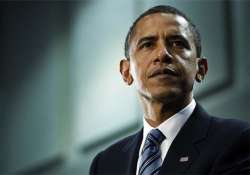Obama's India trip: US analysts cautiously optimistic
Washington: President Barack Obama's upcoming trip to India could well lead to deeper cooperation between the two countries as it was in their mutual interest, analysts suggested though some cautioned against high expectations."Obama and Modi

Washington: President Barack Obama's upcoming trip to India could well lead to deeper cooperation between the two countries as it was in their mutual interest, analysts suggested though some cautioned against high expectations.
"Obama and Modi See Mutual Benefit in Breaking More Ice," said the influential New York Times in a story from New Delhi suggesting "Beneath the surface of the two leaders' personal relationship are the shifting tectonic plates of geopolitics."
"With the expansion of Chinese power into the Indian Ocean, American and Indian interests in the region are gradually converging," it said.
Another "reason for a closer embrace of Washington by New Delhi is that the members of the new political elite around Mr. Modi have far deeper ties to the United States than their predecessors, from the left-leaning and long-dominant Indian National Congress party," the Times suggested.
Many of Modi's supporters, it noted "are Gujarati businessmen who have prospered in the United States and preach the successful immigrants' gospel of free enterprise."
Ashley J. Tellis, a senior associate at the Carnegie Endowment for International Peace, felt Obama's return to India carries "the hope that Washington and New Delhi may succeed in placing their cooperation on firmer foundations."
But "achieving this objective will require reconciling American expectations of exchange-based relations with the Indian desire for a no-obligations partnership," he wrote.
"This challenge is best handled through a set of complementary policies in Washington and New Delhi that together are most aptly characterized as 'unity in difference'," Tellis suggested.
"Achieving a genuine strategic partnership between the United States and India is challenging, but it will be a worthwhile investment in the long-term security and relative power positions of both India and the United States," he wrote.
Tellis recommended that Washington should act to deepen the relationship by strengthening India's capabilities without any expectations of clear quid pro quos.
New Delhi in turn "should articulate a geopolitical vision that preserves a special priority for the United States and look for creative ways to demonstrate strategic solidarity with Washington," he suggested.
However, Michael Kugelman, a senior associate for South Asia at the Woodrow Wilson International Center for Scholars, cited four reasons to keep expectations from Obama's India trip in check.
Despite "the hoopla and hype" he suggested in a blog post in the Wall Street Journal, "It will feature much happy talk but few substantive outcomes."
His reasons: It's too soon after the Modi-Obama meeting in Washington;
Many of India's chief priorities are linked to protracted political debates in Washington; the lingering influence of inconvenient Indian policies and bilateral tensions.
"None of this is to suggest that Obama's visit will not yield deliverables," Kugelman wrote.
"We can expect modest accords on defence, economics, and energy - but nothing like the civil nuclear deal of 2008, which some described as the cornerstone of an emerging strategic partnership," he wrote.